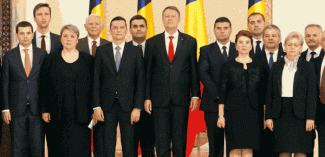Prospects for the centre-left government in Romania

On 4 January, the Romanian Parliament gave a vote of confidence to the centre-left cabinet of Sorin Grindeanu. The new government is made up of the Social Democratic Party (PSD), the clear winner of December’s parliamentary elections, and the centrist Alliance of Liberals and Democrats (ALDE). The Social Democrats’ domination of the political scene and the weakness of the crisis-stricken opposition gives the new coalition a good chance of four years’ stable rule. The de facto leader of the ruling camp, however, is not the Prime Minister, but Liviu Dragnea, the leader of the Social Democrats and speaker of the Chamber of Deputies. The coalition’s main political adversary is President Klaus Iohannis, who is linked to the centre-right opposition camp. The main sources of tension will be the government’s expansionary fiscal economic policy and the ruling coalition’s likely attempts to undermine anti-corruption policy. There is no fundamental difference of views between the President and the government in foreign and security policy, but rivalry and disagreements in this area cannot be ruled out either. Bucharest’s priority will remain the consolidation of trans-Atlantic relations, a strong commitment to NATO, and close cooperation with key European states.
The new government and the Social Democrats’ political dominance
The government is headed by a little-known Social Democratic politician, Sorin Grindeanu, a former member of parliament and minister for information technology. However, there is no doubt that the government’s main decision-maker is the PSD’s leader, Liviu Dragnea. This has been demonstrated by the choice of individual ministers, most of whom are close associates of Dragnea, while the new Prime Minister seems to be completely loyal to the Social Democrats’ leader. Both among the party’s activists and its regional ‘barons’ there is a perception that it is Dragnea’s political and organisational talents which led to its decisive victory in the December elections (46% of the vote). However, Dragnea’s path to the prime minister’s office was blocked by President Klaus Iohannis, who even before the elections announced that he would not nominate a convicted person to the post (in April 2016 Dragnea was convicted in a case related to voter fraud and sentenced to two years’ imprisonment, suspended). In addition to this, there is a statutory prohibition in Romania on convicted persons sitting in the government. It is worth noting, however, that after the elections this law was sent to the Constitutional Court by the ombudsman.
Tensions within the coalition are unlikely, despite some ideological differences between the PSD and the ALDE. The latter’s politicians have striven for years to cooperate with the PSD, and are in too weak position to afford a serious dispute. The government also has a stable platform in parliament, as proved by their vote of confidence (supported by 296 members in the 465-seat parliament). Grindeanu’s cabinet is supported not only by the coalition members (250 seats), but also the deputies representing national minorities, and the Democratic Union of Hungarians in Romania (UDMR), which signed an agreement on parliamentary cooperation with the coalition. The price for their political support might be more financial support for the regions inhabited by the ethnic Hungarian minority.
The opposition is weak and incoherent, and is in no position to threaten the stability of the centre-left government. The major opposition grouping, the centre-right National-Liberal Party (PNL), is going through a serious crisis of both its leadership and its political platform. Moreover, there is the matter of the unfinished reunification of the two different political currents within this grouping. It cannot be ruled out that there will be a split within the PNL, and that some of their deputies and senators will cross over to the ALDE. Meanwhile, the PNL is competing for a similar electorate with the Save Romania Union (USR), a new anti-graft party, which might hinder cooperation within the opposition. Another new group in parliament is the People's Movement Party (PMP) of the former centre-right President Traian Băsescu, which is trying to win over voters with slogans calling for unification with neighbouring Moldova. Băsescu has fought the Social Democrats fiercely for a decade. As president he blocked attempts to limit the powers of the main anti-corruption agency, but after leaving the presidency in December 2014, he began to criticise the current anti-corruption campaign. This could move him nearer to the current coalition’s position.
Cohabitation between government and President: disputes about corruption and the economy
The formation of the centre-left government opens another chapter of cohabitation between President Klaus Iohannis and a centre-left ruling camp. Previously, the period 2012-15 saw the government of the PSD’s then leader Victor Ponta, who resigned after mass demonstrations. Ponta’s government was replaced by a technocratic government under Dacian Cioloș, which worked closely with the head of state. Nevertheless, tensions between the government and the President are part and parcel of the Romanian system. The President has strong powers in foreign and security policy (he participates in NATO and EU summits, and draws up the security strategy), and also has an influence on important nominations (including appointments to the Constitutional Court, the prosecutor’s office, the anti-corruption agency and special services). Conflict between the head of state and the PSD-ALDE coalition has already arisen in the first days after the December elections. Iohannis rejected the first candidate for Prime Minister proposed by the coalition, whose politicians were suggesting the possibility of initiating the impeachment of the President. Grindeanu was accepted by Iohannis as a second choice, but it is possible that the impeachment scenario will regularly be threatened in any further disputes between the President and the coalition. Nevertheless it is quite unlikely that this will be followed through. Maintaining a state of constant dispute with the President might be useful for the coalition, as it will be able to blame any failure of government on him. Similarly, President Iohannis might build his campaign for re-election in 2019 around criticism of the government. Iohannis has so far taken little part in domestic politics, but his decision to clash with the coalition over the Prime Minister’s nomination showed his appetite to be a ‘player president’.
The main source of tension will be the question of moral standards in public life. This subject has been raised by the President, who has warned the parliamentary majority against blocking the process of fighting corruption. The coalition has not officially announced any reverses in the anti-corruption policy. However, the leaders of the PSD and the ALDE (as well as some right-wing politicians) have often levelled harsh accusations that the National Anti-Corruption Directorate (DNA) has become politicised. In recent years, the DNA has conducted a series of cases against politicians from various parties; it prosecuted over 1200 officials in 2015, with a 92% conviction rate. The most prominent cases were brought against Social Democrats; cases are currently ongoing against the former left-wing Prime Minister Victor Ponta (on allegations of money laundering, among other charges), and Călin Popescu Tăriceanu, the leader of the ALDE and the new leader of the Senate (on allegations of giving false testimony, among other charges). Therefore, it is likely that the new coalition would try to limit the powers and independence of the DNA, or hamper anti-corruption efforts by other means. The appointment of the Minister of Justice, Florin Iordache, seems noteworthy; in 2013, he was involved in a controversial attempt to change the criminal code in order to grant broad immunity to public figures. The minister has recently suggested that the government will work on a new law concerning amnesty and powers of pardon.
The second area of dispute between the coalition and the President will be the government’s economic policy. The priority of Grindeanu’s cabinet is to improve the prosperity of citizens by increasing redistribution, reducing and simplifying taxes, and increasing public investment. In this way, the authorities plan to take advantage of the good economic times of recent years, when Romania was one of the fastest growing economies in the EU (GDP growth in 2016 is estimated at 4.7%). In its first days, the government has already raised the minimum wage by 16% (to a level of around €320 per month), increased salaries in local government administration by about 20%, and reduced the level of mandatory pension and health contributions for the lowest earners. The government’s programme also includes the announcement of a rise in pensions by 9% this year, a reduction of income tax from the current 16% to 10% by 2018, and bonuses for families. President Iohannis, who presents himself as a proponent of fiscal rigour, has criticised the plans of the new government, warning against exceeding the 3-percent threshold of the public finance deficit.
Continuation of foreign and security policies
The new government has promised a continuation of the existing foreign and security policies, as is also indicated by the nomination of Teodor Meleșcanu as the head of diplomacy; he began his career in the ministry in the 1960s, and has been a Senator and head of the Romanian foreign intelligence service (2012-2014). Foreign policy, however, will not be the main focus for the new government. Moreover, the main Romanian political parties have maintained a broad consensus on the main lines of action in this area for years. Therefore, there should not be any serious disputes between the government and President Iohannis over foreign and security policy goals. However, if the government ostentatiously backtracks on the anti-corruption policy, triggering conflict with European Commission, foreign policy will be brought into the domestic squabble.
Bucharest has traditionally been committed to the development of trans-Atlantic relations, which are the main pillar of Romania’s security policy. In accordance with its electoral platform, the new government intends to enhance its close relations with the United States, not only in the sphere of defence but also in the broader socio-economic sense. Donald Trump’s victory in the USA is seen by the new team more in terms of an opportunity than a threat. It is unlikely that there will be any change in policy towards Russia, which almost all the Romanian political class sees as a traditional adversary and a rival in neighbouring Moldova. In addition, the annexation of Crimea has strengthened the sense of insecurity vis-à-vis Russia. In this context, the government has stressed the strategic importance of the Black Sea basin, as well as the need to further reinforce the eastern flank of NATO, maintaining defence spending at the level of 2% of GDP.
Romania will continue to base its European policy on cooperation with the biggest EU countries, especially Germany (despite differences in the two states’ approaches to migration policy), as well as the major European countries – Italy, France, Spain, Great Britain and Poland – with which Bucharest constantly wants to maintain the best relations. Efforts to join the Schengen area and abolish the EU co-operation and verification mechanism (CVM, a special procedure for the European Commission to monitor Romania’s progress in reforming the justice system and fight corruption) are still of fundamental importance. The government’s other foreign priorities include preparations for the Romanian presidency of the EU in the first half of 2019. This will be a matter of prestige for Bucharest (as the country’s first EU presidency), especially as this period may see the final negotiations on Brexit. The government has also promised to strengthen bilateral diplomacy and its relations with its neighbours. Another priority is supporting Moldova on the path to European integration, and greater support for the Romanian diaspora abroad.
Tomasz Dąborowski



